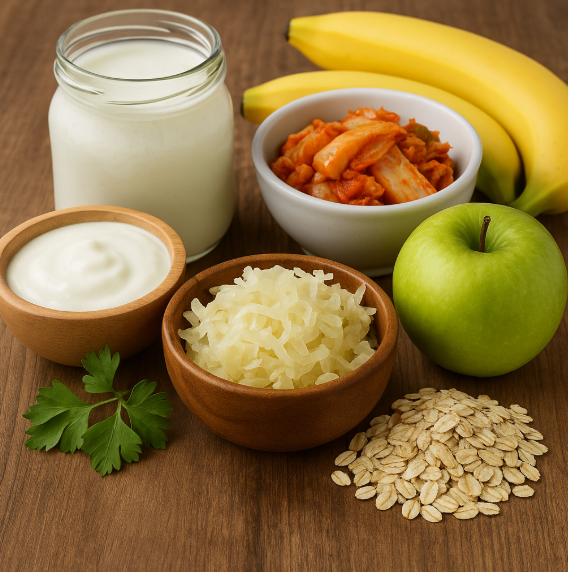Table of Contents
When Gut Health Became Personal for Me
For most of my life, I didn’t give much thought to my stomach unless something was wrong. I ate what I wanted, grabbed food on the go, and assumed my body would just handle it. But as the years went by, I noticed things I couldn’t ignore sluggish mornings, mid-day crashes, bloating after meals, and this heavy feeling that lingered no matter what I ate.
At first, I thought it was just stress or getting older. But then a close friend casually mentioned that when she started paying attention to her gut health, everything from her energy to her mood began to shift. I honestly rolled my eyes at the idea that “gut health” could be the secret. But curiosity got the better of me, and once I started experimenting with small changes, I realized she was right.
Now, everywhere I look, people are talking about gut health. And for good reason it’s not just a trend. It’s something that quietly impacts how we feel every single day.
What I Learned About the Gut
Here’s what blew my mind: our guts are like bustling little cities filled with trillions of bacteria. Some are good, some are not-so-good, and they’re constantly working behind the scenes. These microbes don’t just handle digestion; they affect immunity, energy levels, even how our brains function.
I remember reading about the “gut-brain connection” and thinking, “So maybe my brain fog and my upset stomach are actually linked?” And it made sense because on weeks when I was living on takeout and skipping sleep, I didn’t just feel heavy in my body, I felt it in my mood too.
It was strange but also kind of freeing. Instead of thinking I needed a hundred fixes for a hundred problems, I realized a lot of it came back to this one thing: taking care of my gut.
The Gut–Mood Rollercoaster
This part was the most personal for me. I’ve always struggled with feeling a little anxious, but I never connected it to what I was eating. Then I noticed a pattern: weeks where I ate junk, I was more restless, edgy, and tired. Weeks where I added in more whole foods and probiotics, I felt calmer and sharper.
It wasn’t that food magically “cured” my mood, but it supported me in a way I hadn’t expected. Suddenly, I could see how my stomach and my mind were having this ongoing conversation. And when I listened and made better choices, both sides thanked me.
Why Everyone’s Suddenly Talking About Gut Health
I think gut health is everywhere now because people are realizing quick fixes don’t last. We’ve all tried the diets, the energy drinks, the endless cups of coffee. But when you focus on your gut, it feels less like a hack and more like taking care of the actual engine that runs your body.
Social media probably helps too. I can’t scroll for five minutes without seeing someone talking about probiotics, kombucha, or “healing their gut.” At first, it sounded gimmicky to me, but when I started paying attention to how many people were sharing real results, I realized this wasn’t a fad it was a shift.
My First Baby Steps
I didn’t suddenly throw out everything in my pantry and start eating kale all day. That would never stick. Instead, I made one small swap: I started eating plain Greek yogurt with fruit instead of grabbing flavored yogurt cups loaded with sugar. It was a small change, but it felt doable, and it gave me a little confidence.
Next, I tried kefir, which honestly tasted weird at first, but I stuck with it. Then I added bananas and oats in the morning. These didn’t feel like sacrifices they were just gentle tweaks that slowly became part of my routine. And the best part? Within a few weeks, my digestion started to feel more normal, my bloating went down, and I wasn’t crashing as hard in the afternoons.
Foods That Became My Go-To
Once I got into the rhythm, I found myself reaching for certain foods more often because they just made me feel better. Yogurt and kefir became easy probiotic sources. Bananas, apples, and oats gave me that prebiotic boost. And when I was feeling adventurous, I’d add sauerkraut or kimchi to my meals.
I used to think fermented foods were strange, but now I actually crave the tangy crunch of sauerkraut on a sandwich. It’s funny how tastes can change when you start associating foods with how good they make you feel afterward.
I also leaned more into fiber beans, lentils, and veggies that kept me full but light. I used to think fiber was boring, but once I connected it to how energized I felt, I started to appreciate it more.
Beyond Food: The Lifestyle Side
I’d be lying if I said food was the only thing that mattered. Stress was another huge factor for me. On weeks when I was anxious and overworked, my gut reacted no matter how healthy I ate. That’s when I started making time for small rituals short walks after meals, deep breathing, even just logging off my phone earlier at night.
Hydration was another game-changer. I realized half my fatigue was just dehydration in disguise. Now I keep a water bottle nearby, and it makes more difference than I ever imagined.
And of course, sleep. I used to treat sleep like an optional luxury, but once I started honoring it, my digestion and energy naturally improved. It turns out, the gut really does repair itself when you rest.
What Changed for Me
I won’t pretend that everything magically became perfect. I still have off days, and I still enjoy pizza or ice cream without guilt. But the difference now is that I know how to support my body so it bounces back quicker.
The biggest change is how much lighter I feel not just physically, but mentally. I don’t carry that sluggish weight around as often. My moods are more stable, and my energy is steadier. And all of that came from small, approachable changes I actually enjoy.
Final Thoughts: It’s Not About Perfection
If you’re curious about gut health, my biggest piece of advice is to start small. You don’t need to buy every supplement or cut out all your favorite foods. Just pick one easy swap maybe a yogurt, maybe a banana, maybe a little sauerkraut on the side and see how your body responds.
The reason everyone’s talking about gut health right now is because it touches every part of life your energy, your mood, your immunity. And once you feel the difference, you understand why it’s such a big deal.
For me, it stopped being about “fixing” problems and started being about caring for myself in a way that feels sustainable. And honestly? That’s a much better way to live.



